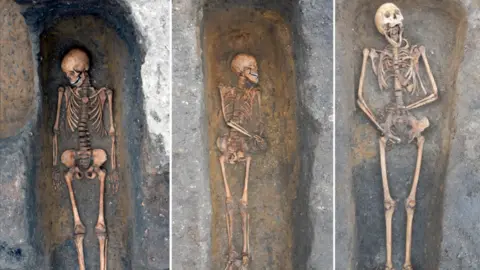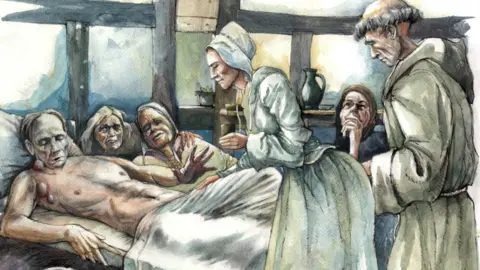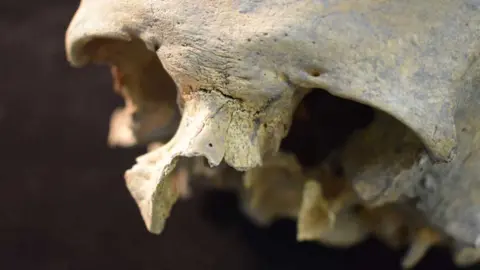Cambridge Black Death victims buried with compassion, study finds
 Cambridge Archaeological Unit
Cambridge Archaeological UnitThe traumatic death toll of the Black Death did not stop people from treating their deceased with "care and compassion", research has revealed.
Between 40 and 60% of the population died during the plague pandemic, which reached Europe in the 14th Century.
Archaeologists have found evidence that individual burials continued in Cambridge, as well as mass graves.
The team from Cambridge University said "this had been impossible to confirm until now".
Senior project officer Craig Cessford said it "shows that even in incredibly traumatic times during past pandemics, people tried very hard to bury the deceased with as much care as possible".
 Mark Gridley
Mark GridleyThe disease killed so rapidly it left no visible traces on the skeleton, meaning archaeologists had previously been unable to identify individuals who died of plague, unless they were buried in mass graves.
Researchers from the After the Plague project identified the presence of plague-causing pathogen Yersinia pestis by studying the DNA from the teeth of medieval bodies.
They were buried at a parish cemetery and friary in Cambridge, excavated in 2017, and at the nearby deserted village of Clopton.
 John Robb
John RobbThe researchers discovered at least three plague victims buried within the chapter house of the friary.
Mr Cessford said the "burials show that even during plague outbreaks, individual people were being buried with considerable care and attention".
He contrasted this with the "apocalyptic language used to describe the abandonment" of the Cambridge church All Saints' by the Castle, when it was reported in 1365 that "the church was partly ruinous and 'the bones of dead bodies are exposed to beasts'".
Mass burials of plague victims were also uncovered in Cambridge, at St Bene't's churchyard.
The land was soon after transferred to Corpus Christi College, when it was founded by the St Bene't's parish guild to commemorate Black Death victims.
For centuries, members of the college would walk over the plague pit on their way to church.

Find BBC News: East of England on Facebook, Instagram and Twitter. If you have a story suggestion email [email protected]
